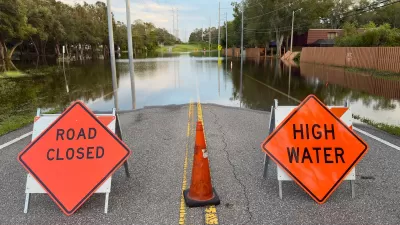As flooding, fires, and other disasters become more destructive, an effective response requires more resources than local governments can offer.

In an article for Governing, Donald F. Kettl argues that the federal government shouldn’t abandon disaster mitigation and relief to local governments and private insurers, as some have suggested.
“Virtually every part of the country is seeing more and larger emergency events, on a truly historic scale,” Kettl writes, with two major implications: first, local governments and even state governments don’t have the capacity and resources to respond to disasters as quickly as FEMA.
“Second, more mandates have followed federal aid. The feds are now requiring everyone who has had property damaged in a flood disaster within a high-risk flood area to buy insurance, either from a private company or from the federal National Flood Insurance Program.” FEMA also started a voluntary “severe repetitive loss” program that allows state and local governments to buy out properties that suffer repeated damage.
For Kettl, the federal government’s growing role in disaster management is inevitable.
FULL STORY: Why Washington Can't Get Out of the Disaster Relief Business

Planetizen Federal Action Tracker
A weekly monitor of how Trump’s orders and actions are impacting planners and planning in America.

Congressman Proposes Bill to Rename DC Metro “Trump Train”
The Make Autorail Great Again Act would withhold federal funding to the system until the Washington Metropolitan Area Transit Authority (WMATA), rebrands as the Washington Metropolitan Authority for Greater Access (WMAGA).

The Simple Legislative Tool Transforming Vacant Downtowns
In California, Michigan and Georgia, an easy win is bringing dollars — and delight — back to city centers.

The States Losing Rural Delivery Rooms at an Alarming Pace
In some states, as few as 9% of rural hospitals still deliver babies. As a result, rising pre-term births, no adequate pre-term care and "harrowing" close calls are a growing reality.

The Small South Asian Republic Going all in on EVs
Thanks to one simple policy change less than five years ago, 65% of new cars in this Himalayan country are now electric.

DC Backpedals on Bike Lane Protection, Swaps Barriers for Paint
Citing aesthetic concerns, the city is removing the concrete barriers and flexposts that once separated Arizona Avenue cyclists from motor vehicles.
Urban Design for Planners 1: Software Tools
This six-course series explores essential urban design concepts using open source software and equips planners with the tools they need to participate fully in the urban design process.
Planning for Universal Design
Learn the tools for implementing Universal Design in planning regulations.
Smith Gee Studio
City of Charlotte
City of Camden Redevelopment Agency
City of Astoria
Transportation Research & Education Center (TREC) at Portland State University
US High Speed Rail Association
City of Camden Redevelopment Agency
Municipality of Princeton (NJ)





























